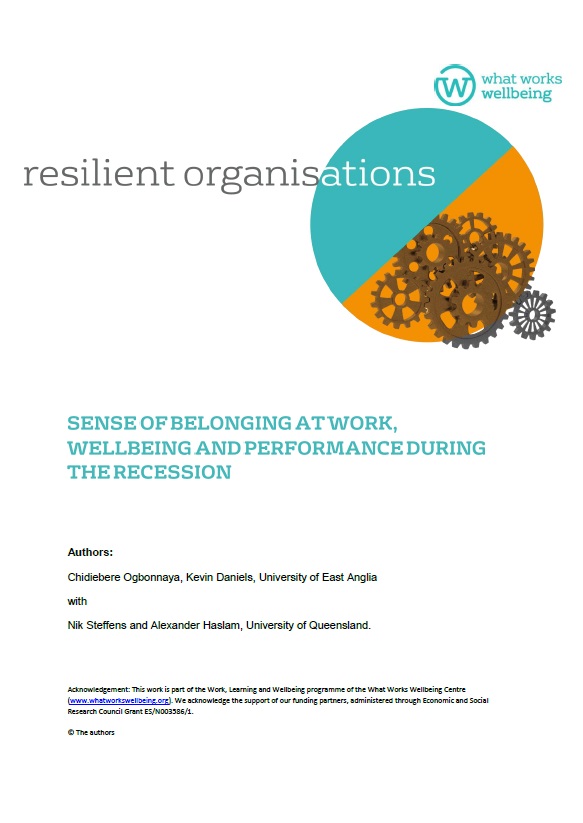Resilient Organisations: Sense of Belonging at Work, Wellbeing and Performance During Recession
Downloads

Intro
This study explores whether a sense of belonging also contributes to organisational resilience. To do so it looks at UK data from the British Workplace Employment Relations Survey, before and after the 2008 recession to show that a sense of belonging in the workplace may help maintain wellbeing and organisational performance through adversity.
Workplace belonging is gauged by asking whether employees share the values of the organisation where they work, and how loyal and proud they are of the organisation.
Key messages
For a thriving country and workforce, we need to understand what can help organisations maintain economic performance and workplace wellbeing in turbulent times. Past evidence shows that a sense of belonging and identity in the workplace is associated with higher wellbeing. In an experimental study simulating a prison environment, there is evidence that in groups with a strong sense of identity, people are likely to help each other during times of adversity.
This study explores whether a sense of belonging also contributes to organisational resilience. To do so it looks at UK data from before and after the 2008 recession to show that a sense of belonging in the workplace may help maintain wellbeing and organisational performance through adversity.
Workplace belonging is gauged by asking whether employees share the values of the organisation where they work, and how loyal and proud they are of the organisation.
We found that workplaces that had been hit by the recession, but where employees had a strong sense of organisational identity were:
- More than four times more likely to have withstood negative effects of recession on employee wellbeing than workplaces with a weak sense of identity.
- Almost four times more likely to have maintained high levels of organisational performance.
As with any study, there are limitations to these findings: for example we were reliant on managers’ reports of organisational performance, and we were not able to follow employees over more than two time points.
However, they are consistent with international evidence showing the importance of workplace belonging for organisational performance and wellbeing. Based on this evidence, we recommend that to improve worker wellbeing and organisational productivity:
- Organisations and managers use existing evidence to improve sense of belonging at work. Such actions can be cost effective and easy to implement and can include workshops, mentoring programmes, action planning groups and social events.
- Organisations test and develop evidence-based approaches to improve workplace wellbeing by improving organisational identities.
Implications
As with any study, there are limitations to these findings (see the section on further research). However, they are consistent with international evidence showing the importance of workplace belonging for organisational performance and wellbeing. Based on this evidence, we recommend that to improve worker wellbeing and organisational productivity:
- Organisations and managers use existing evidence to improve sense of belonging at work. Such actions can be cost effective and easy to implement and can include workshops, mentoring programmes, action planning groups and social events.
- Organisations test and develop evidence-based approaches to improve workplace wellbeing by improving organisational identities.
- Trade Unions, professional groups and business groups use their influence to inform and help managers improve wellbeing and performance in their organisations. To do so, they should ensure they have a rounded picture of the evidence by considering further evidence reviews on how to improve employee
wellbeing. - Policy makers should also consider evidence reviews on how to improve wellbeing and social relations in the workplace, as well as understand the patterns of high and low job quality in the UK. They should look to the evidence on how to improve sense of belonging at work and use it to inform:
- Practice in the public sector
- Commissioning decisions, by purchasing goods and services from suppliers that can demonstrate a commitment to developing workplace sense of
belonging - Initiatives to educate managers on how to improve employee wellbeing
Downloads
Downloads
![]()
[gravityform id=1 title=true description=true ajax=true tabindex=49]


